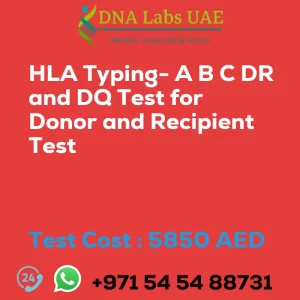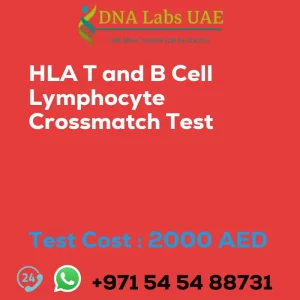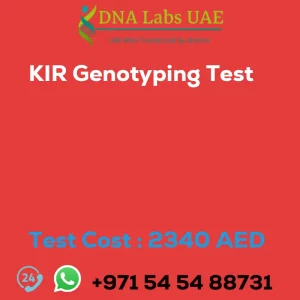HLA SINGLE ANTIGEN BEAD ASSAY FOR CLASS I IgG ANTIBODIES DSA-SAB CLASS I Test
Test Name: HLA SINGLE ANTIGEN BEAD ASSAY FOR CLASS I IgG ANTIBODIES DSA-SAB CLASS I Test
Components: Price: 5150.0 AED
Sample Condition: 2 mL (1 mL min) serum from 1 SST. Ship refrigerated or frozen. Please provide a brief clinical history.
Report Delivery: 10-12 days
Method: Luminex X-Map technology
Test Type: Transplantation
Doctor: Nephrologist
Test Department:
Pre Test Information: Please provide a brief clinical history.
Test Details:
The HLA single antigen bead assay for class I IgG antibodies is a diagnostic test used to identify the presence of donor-specific antibodies (DSA) in patients who have received organ transplants. This test is based on the detection of antibodies against human leukocyte antigens (HLA), which are proteins found on the surface of cells that play a critical role in the immune response.
The HLA single antigen bead assay involves the use of microbeads that are coated with specific HLA antigens. These beads are incubated with the patient’s serum, and any antibodies present in the serum will bind to the corresponding HLA antigen on the bead. The beads are then washed to remove any unbound antibodies, and a fluorescently labeled secondary antibody is added to detect the bound antibodies. The level of fluorescence on each bead is measured using a flow cytometer, and the results are analyzed to determine the presence and strength of DSA.
The assay can detect antibodies against multiple HLA antigens simultaneously, allowing for a comprehensive assessment of the patient’s immune response. The HLA single antigen bead assay for class I IgG antibodies is considered a highly sensitive and specific test for the detection of DSA and is commonly used in clinical practice to monitor transplant patients for signs of rejection.
The test can also be used to identify potential donors who are compatible with the patient’s immune system and to guide the selection of immunosuppressive therapies to prevent rejection.
| Test Name | HLA SINGLE ANTIGEN BEAD ASSAY FOR CLASS I IgG ANTIBODIES DSA-SAB CLASS I Test |
|---|---|
| Components | |
| Price | 5150.0 AED |
| Sample Condition | 2 mL (1 mL min) serum from 1 SST . Ship refrigerated or frozen. Give brief clinical history. |
| Report Delivery | 10-12 days |
| Method | Luminex X-Map technology |
| Test type | Transplantation |
| Doctor | Nephrologist |
| Test Department: | |
| Pre Test Information | Give brief clinical history. |
| Test Details |
The HLA single antigen bead assay for class I IgG antibodies is a diagnostic test used to identify the presence of donor-specific antibodies (DSA) in patients who have received organ transplants. This test is based on the detection of antibodies against human leukocyte antigens (HLA), which are proteins found on the surface of cells that play a critical role in the immune response. The HLA single antigen bead assay involves the use of microbeads that are coated with specific HLA antigens. These beads are incubated with the patient’s serum, and any antibodies present in the serum will bind to the corresponding HLA antigen on the bead. The beads are then washed to remove any unbound antibodies, and a fluorescently labeled secondary antibody is added to detect the bound antibodies. The level of fluorescence on each bead is measured using a flow cytometer, and the results are analyzed to determine the presence and strength of DSA. The assay can detect antibodies against multiple HLA antigens simultaneously, allowing for a comprehensive assessment of the patient’s immune response. The HLA single antigen bead assay for class I IgG antibodies is considered a highly sensitive and specific test for the detection of DSA, and is commonly used in clinical practice to monitor transplant patients for signs of rejection. The test can also be used to identify potential donors who are compatible with the patient’s immune system, and to guide the selection of immunosuppressive therapies to prevent rejection. |








